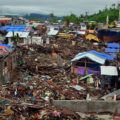Designing a funding framework for the slow-onset impacts of climate change: insights from recent experiences with planned relocation
Drawing on relevant global experience, this paper investigates recent approaches to planned relocation of communities as one possible response to climate change impacts.










